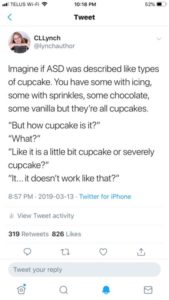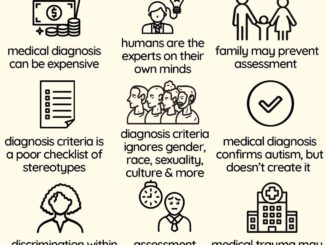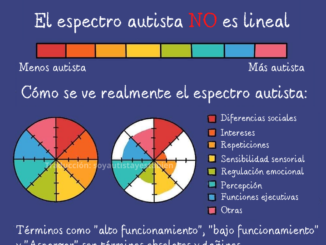You may have heard someone say, “He has severe autism” or “They have mild autism”. You might have heard “She has high-functioning autism” or “He is very low-functioning”. In response to some backlash against these terms, there has even been a newer push towards classifying autism into “level 1, 2, and 3”. And, as I mentioned in another post, there was also formerly a separate diagnosis of Asperger syndrome, which fell under the header, usually, of “mild autism”.
In general, the Autistic community does not like these classifications.
You can refer back to the comic I posted a few days ago about the “spectrum” — how it’s not so much a sliding scale of “not autistic” to “very autistic”, but rather a multidimensional wheel of different factors that are often affected by autism.
To pull in the language from another of these posts, let’s imagine one Autistic person — I’ll call them Alex — who is very monotropic (singularly minded) in their body’s sensory processing abilities. Their brain has a limited number of channels for processing the sensory input from the world around them. This results in intense, overwhelming sensory overload for them a lot of the time.
Alex’s brain is very polytropic (processing multiple different tracks at the same time) when it comes to communication, however. Alex can communicate in a way that appears very neurotypical in nature. They might make eye contact in the way and amount that is preferred by neurotypical people, their body uses nonverbal cues and gestures in that way as well, etc.
From the outside, then, a neurotypical person might look at Alex, and say “Wow, they are ‘high-functioning’.”
And then they might look at another Autistic person — we’ll call them Bailey. Bailey has the opposite two characteristics. Their brain doesn’t experience high-intensity sensory overload. However, Bailey *does* have a very monotropic way of communicating. This results in their body focusing so hard on the content they’re trying to communicate that it does not focus on the incidental noises that come out as well, nor the body movements, gestures, or facial expressions that happen while Bailey uses their preferred communication method. The neurotypical person might look at Bailey and their very neurodivergent way of communicating — and say “Wow, that person is ‘low-functioning’.”
(As an aside, please remember that there are much more than just 2 characteristics that would be present in any person and on any discussion of the autism spectrum — but for the sake of simplicity of this example, I’m just using “sensory processing” and “communication” as the only two.)
Back to Alex, the person with intense sensory overload but a typical-presenting style of communication. Someone calls them “high functioning”, or maybe “level 1 autistic”, or maybe says they have “mild” autism. The NT person making that judgment call is literally only describing the autistic person in relation to themselves — how difficult they are for the NT person to communicate with and understand. They’re not challenging at all! They communicate so well! And for Alex, who is struggling with their own overwhelming sensory challenges, if they internalize those well enough, the average NT person in their life might not even be aware of them at all.
Bailey isn’t having any of that overwhelming internal sensory struggle, but they’re communicating in a divergent manner. So they’re inconvenient to the NT person who’s trying to talk to them — who calls them “low-functioning”, or “level 3 autistic”, or “severely autistic” as a result.
Hopefully you can see how harmful this classification is. It’s not based on anything going on for Bailey or Alex or the way either of them feels and it does nothing to specify what specific challenges the person is facing. It literally only describes the challenges an NT person faces when they’re trying to interact with them.
I have heard it said that calling someone “high-functioning”, like Alex, is simply used to deny Autistic people supports. (“Why do you need that? You’re fine, you can xyz…”)
Whereas calling someone “low-functioning”, like Bailey, is simply used to deny Autistic people autonomy. (“They can’t be trusted to make the best decisions for their own life, after all, they can’t even communicate ‘normally’ to me about it…”)
I occasionally end up using descriptors of functional levels on a professional basis. I sometimes find myself needing to describe a diagnosis in more specific detail for the purposes of being able to help a child (or, rarely, adult) find the supports they need. But when I do, I try to make it specific. “This person has sensory difficulties in this area. This type of language is helpful for them. They use this method of alternative communication under these circumstances, or that method under those circumstances. Executive functioning in the areas of x, y, and z is a struggle for them.” You get the idea.
Some Autistic people do personally prefer to use “mildly autistic”, “high-functioning autistic”, “has Asperger’s syndrome” etc to self-describe. I don’t think it is appropriate to correct someone who *is* autistic about the way that they prefer to self-describe.
For NT people, on a non-professional level — when describing a friend, a child, a celebrity, a blogger, etc — there is no need to use these classifications to talk about autistic people. Autistic people are autistic people. It is not a contest, and defining ability by convenience to neurotypical people instead of by lived experience is harmful.




